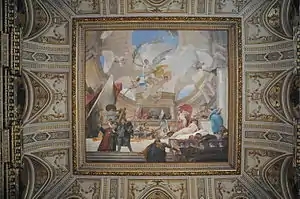Paintings in the staircase of the Kunsthistorisches Museum
The staircase of the Kunsthistorisches Museum in Vienna is equipped with spandrel and intercolumniation paintings by Gustav Klimt, Ernst Klimt and Franz Matsch, lunette pictures by Hans Makart and a ceiling painting by Mihály Munkácsy.
History
In the middle of 1881 the committee in charge of building in Vienna commissioned Hans Makart with the overall equipment of the large staircase. However, since Makart died in 1884, only the lunette pictures had been completed by then and could be affixed to the walls of the museum. The committee had to look for other artists for the missing spandrel and intercolumniation paintings. In 1885 Hans Canon was initially entrusted with the ceiling painting, but he also died a few months later. Finally, Mihály Munkácsy was commissioned to paint the ceiling with Apotheosis of the Renaissance, which was completed in the middle of 1890. The Maler-Compagnie, in which the brothers Gustav and Ernst Klimt as well as Franz Matsch had merged, was to carry out the spandrel and intercolumniation pictures. The works were completed in 1891.[1] Concept and naming of the interior came from Albert Ilg.[2]
Ceiling painting: Mihály Munkácsy
Munkácsy's Apotheosis of the Renaissance seems like a building of the Renaissance with a dome, which is opened to the sky. In a loggia one can see the pope, below Michelangelo, Leonardo da Vinci and Raphael. Tizian gives lessons in painting, and Paolo Veronese stands on a framework. Personalized representations of fame and glory of the arts hover above - Pheme and Glory.
Plan
 |
||||||||||
| Makart
Michaelangelo |
Makart
Allegory of painting |
Makart
Titian | ||||||||
| Gustav Klimt
Roman and Venetian Quattrocento |
Gustav Klimt
Ancient Greece and Egypt |
Gustav Klimt
Old Italian art | ||||||||
| Makart
Rubens |
Ernst Klimt
Holland and Flemish school |
 |
Ernst Klimt
German Renaissance |
Makart
Van Dyck |
 | |||||
| Makart
Rembrandt |
Franz Matsch
Barocco and Rococo |
Ernst Klimt
Spain and Netherlands |
Makart
Velazquez |
 | ||||||
 |
Makart
Raphael |
Gustav Klimt
Florentine Cinquecento and Quattrocento |
Ernst Klimt
Italian High Renaissance |
Makart
Leonardo da Vinci |
 | |||||
| Mihály Munkácsy. Apotheosis of the Renaissance | ||||||||||
| Franz Matsch
Karolingian and Burgundian time |
Franz Matsch
Roman and Byzantine art, Roman Antique |
Franz Matsch
North Gothic in the Late Middle Ages | ||||||||
 |
 |
 | ||||||||
| Makart
Durer |
Makart
Allegory of sculpture |
Makart
Holbein | ||||||||
References
- Otmar Rychlik: Gustav Klimt, Franz Matsch und Ernst Klimt im Kunsthistorischen Museum. Catalog for the special exhibition (Klimt-Bridge), page 12. Edition Kunst, Kunsthistorisches Museum, Vienna 2012.
- Das Unsichtbare sichtbar machen/Make the invisible visible. Article by Beatrix Kriller-Erdrich, p. 5. Kunsthistorisches Museum, Vienna 1991.
External links
| Wikimedia Commons has media related to Kunsthistorisches Museum Wien (Grand staircase) - wall paintings. |
- Gustav Klimt im Kunsthistorischen Museum. Article by KHM for the special exhibition (Klimt-Bridge) 2012. Visited on December 23, 2013.
- KHM: Brücke bringt Besuchern Klimt näher. Article by Kurier on the occasion of the special exhibition Klimt-Bridge in 2012. Slideshow. Visited on December 23, 2013.
- Munkácsy Mihály: Apotheose der Renaissance. Thesis by Bernadett Doór, University of Vienna, 2013.